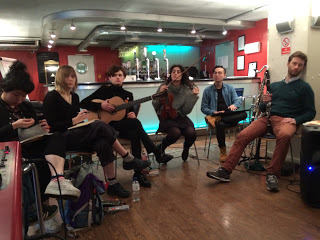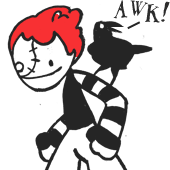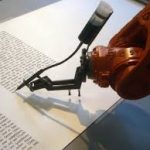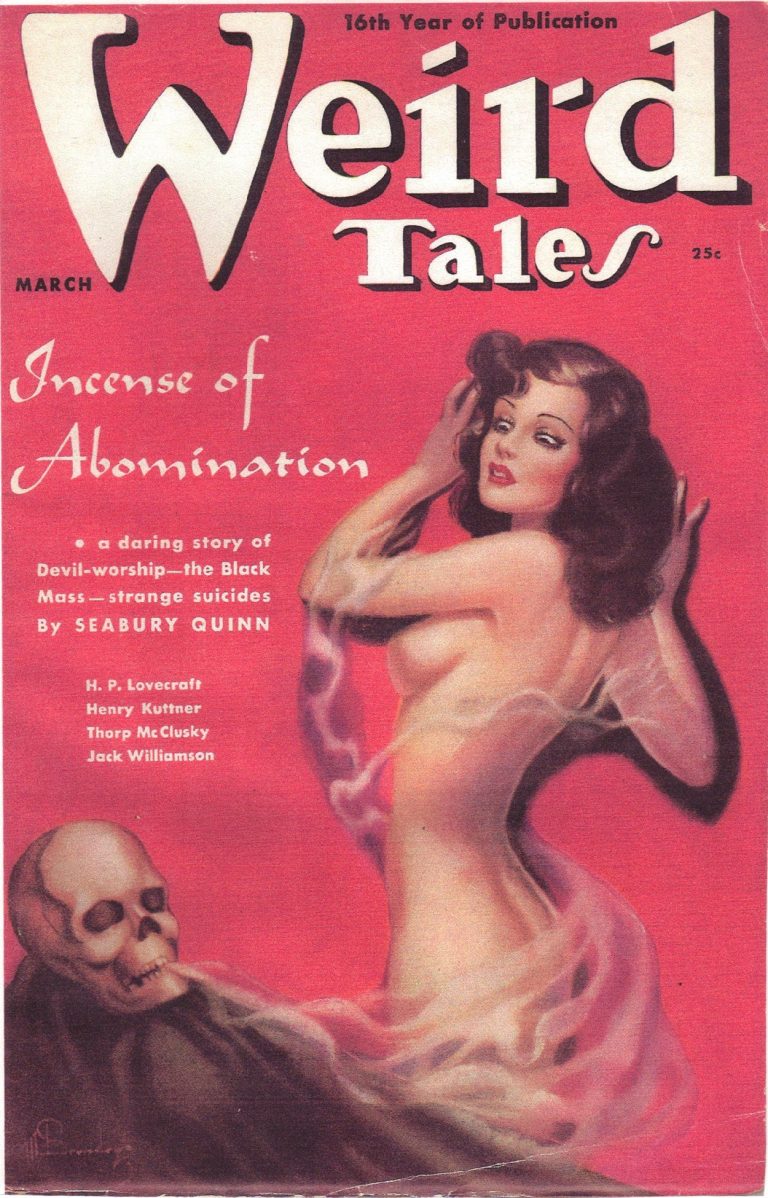Thursday 17th March 2016 saw one of the most exhilarating poetry performances I’ve ever witnessed, let alone taken part in. Club Inégales in Euston hosted Found in Translation, in which poets, illustrators and musicians came together to form a cross-disciplinary band.
Found in Translation was organised by Peter Wiegold and Martin Butler of Club Inégales, in collaboration with House of Illustration, Modern Poetry in Translation and if:BOOK, following a suggestion from if:BOOK founder and Academy Inégales member Chris Meade that they form a band with translators.
During two fascinating workshops, we worked together, learning from each other, reacting to each other, dipping into Assyrian, Russian, German and the boundless languages of visual art and music, and working to create collaborative soundscapes touching on the idea of translation.
Just as I find collage freeing and playful, because it allows me to monkey with other people’s words and images, getting to meet and respond to such talented, inquisitive artists in different disciplines was a really joyful, fertile experience. When else would I get to hear the subtle clicks and pounds of tabla drums played close up, or the sound of a Korean flute leaping high and swooping low? To work alongside live illustrators, translating music and words into bold visual ideas? A hell of a treat, and one that, in juxtaposing it with drawing, movement, animation and music, helped bring poetry’s role as an artform into focus.

Photo: Chris Meade
The final performance was made up of two halves. The first half consisted of solos in chains of translation. During the workshops, we had played ‘Telephone’ across forms: a musician played for a poet, who then responded to the piece and showed their work to an illustrator or another musician or another poet, with each artist translating the piece before. Every translator only had access to the piece immediately before; as in a Markov chain, the process was memoryless beyond this point, straying away on a journey of its own. We wondered whether to bring back the original spur at the end of each chain, to link the end back to the beginning. In the end, however, we finished each chain on the point furthest from the start. Giving up that cyclical control left each piece satisfyingly open-ended, celebrating the diverse range of reactions and associations that had occurred.
The second half was an ensemble affair, with the ‘band’ sat together, reacting to director Peter Wiegold’s cues, in a part-rehearsed, part-improvised cavalcade of sight and sound. A central guitar riff was threaded through the main band performance (I can still hear it now in my head), with live illustration throughout, and at intervals, this jam would drop back. Part of the poetic contribution to the band was a series of homophonic and otherwise non-traditional translations to an Assyrian piece introduced by Syrian poet Nineb Lamassu.
When the music dropped down, we would shift into micro-bands, groups of four or five musicians and poets performing breakout pieces. When each micro-piece ended, we were folded back into the main band once more, in a great big meal of sound.
The whole process, from workshop to show, was challenging (learning to read and responded to band signals took me longer than most) and completely thrilling. Working with professional musicians and talented illustrators, as well as in collaboration with other poets, I found myself loosening up, wanting to play and becoming less fearful of making mistakes. I wrote and wrote, listened and listened, gawped and chattered. For once, I didn’t feel like an imposter pretending to be an artist, but a part of the band. I’m very grateful for that.
As Wiegold says on the Club Inégales website:
Club Inégales is a place of surprises, do not expect the conventional! it’s not a jazz club, not a new music venue, not a comedy club, not a world music venue.
But expect all of these to appear, as we search for the best of real new, spontaneous performance.
It’s worth recording the gist of a post-show comment from poet Jon Stone:
It was one of the rare occasions during a poetry performance where it ended and I thought “Don’t stop!”
**
Found in Translation featured (in rough order of appearance):
Peter Wiegold: Band leader and keys
Sasha Dugdale: Poetry
Nineb Lamassu: Poetry
Ben Zucker: Trumpet
George Sleightholme: Clarinet
Layale Chaker: Violin
Will Crosby: Guitar and Pedals
Martin Butler: Piano
George Barton: Musical saw, vibraphone
May Kindred-Boothby: Illustration
Martin Humphries: Trombone
Joanna Lawrence: Violin
Joel Bell: Guitars and pedals
Kirsten Irving: Poetry
Rishiraj Kulkarni: Tabla
Rondi Park: Illustration
Chris Meade: Poetry
Nouria Bah: Singing and Poetry
Laura: Illustration
Olivia McCannon: Poetry
Hyelim Kim: Korean Flute
James Wilson: Piano
Andy Leung: Electronics
Ed Cottrell: Poetry
For more information about the event, including photos and recordings, visit the Academy Inegales blog.
To find out more about the remarkable Club Inégales, including their forthcoming projects and performances, visit their website and follow them on Twitter.



